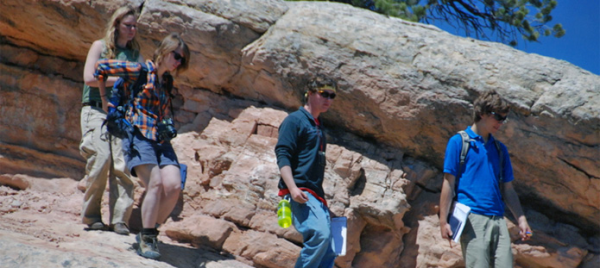GY135 - Geology of the Pikes Peak Region
GY 135 is an introductory physical geology course with a strong emphasis on conceptual understanding of the geologic sciences though mainly outdoor observation and inquiry. During this course students learn to identify minerals and rocks in outcrops, to make observations and interpretations of the history of the rocks, to understand the processes that cause folding, faulting and erosion of the rocks, and to solidify this knowledge through lab work and field observation. Students will be evaluated on the basis of their ability to observe, analyze and interpret geologic phenomena, as well as with a traditional test on classroom-based material. The course is designed build practical skills in practice of the scientific method, critical thinking, and quantitative analysis. Schedule: Several field trips Meets the Critical Perspectives: Scientific Investigation of the Natural World lab or field requirement. (Summer only 2025-26).
Degree requirement — Critical Perspectives: Lab
1 unit
Previously Featured Offering

GY135 is an introductory physical geology course with a strong emphasis on field observations, critical-thinking, and use of the Scientific Method. We only lecture 2-3 days on campus and teach the rest of the course in the field and through interactive laboratory activities.
During this course students learn to identify minerals and rocks in outcrops, to make observations and interpretations of the history of the rocks, to understand the processes that cause folding, faulting and erosion of the rocks, and to record these observations and interpretations on maps. Students will be evaluated on the basis of their ability to observe, analyze and interpret geology in the field, as well as with traditional tests on comprehension of the material.
As usual at CC, we also emphasize interdisciplinary learning on these trips and will include some natural history and ecology in our discussions. Such interconnectedness is crucial to the understanding of Earth Systems we try to convey by the end of the class, and will be useful for students pursuing degrees in any of the natural sciences and/or environmental studies.
The bulk of the class will take place on extended, weeklong field trips, with significant outdoor components (camping, hiking, backpacking, rafting) and some in-the-building lecture/lab support.
No offerings are currently scheduled.



